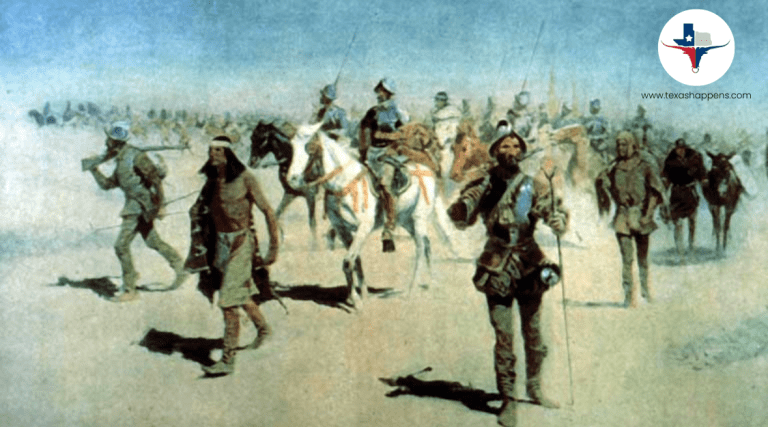Born in 1510 in Salamanca, Spain, Francisco Vázquez de Coronado was a prominent figure in the early exploration of the New World. At the age of 25, he ventured to Mexico City, where he settled, married Beatriz de Estrada, and started a family. His career in the New World advanced quickly; by 1538, he had become the governor of the province of Nueva Galicia.
Coronado’s fame largely stems from his ambitious expedition in search of the mythical Seven Cities of Cíbola, believed to be rich in gold and other treasures. This journey began in 1540 when he led a formidable force of nearly 1,000 men from Mexico into the southwestern United States and parts of northern Texas. Despite extensive searching, no treasures were found.
The expedition traversed many areas, including present-day New Mexico, Arizona, and Kansas. Major landmarks like the Grand Canyon and the Colorado River were documented, although these discoveries did little to alleviate the sense of failure as no riches were uncovered. Much of his contingent returned to Mexico the following year, dispirited and weighed down by empty saddlebags. Coronado, along with a smaller group, persisted until 1542 before admitting defeat and heading back to Mexico City.
Upon his return, Coronado faced significant criticism. The failure to locate the fabled cities damaged his credibility. Nevertheless, he managed to regain some status and served as a city councilman until his death on September 22, 1554.
The stories of lost treasures and travels circulated long after Coronado’s excursion ended. His expedition marked the start of a continuous flow of tales about buried treasures in Texas. These legends caught the imagination of countless others, including the famous Jim Bowie and later treasure seekers in the 1850s. Books about treasure hunting in Texas continue to be popular and easily accessible even today.
The legend of the Seven Cities of Cíbola captivated not only Coronado but also inspired historical figures who came after him. Explorers and adventurers have frequently sought these elusive riches, making Coronado’s journey a notable chapter in the broader history of exploration in North America.
Despite the hardships and the expedition’s ultimate failure to find gold, Coronado’s ventures provided valuable geographical and cultural insights. Interaction with various Native American tribes and observations about the land shaped the early European understanding of the southwestern United States.
Coronado’s expedition was part of a larger quest during the Age of Exploration, driven by the search for wealth and the expansion of European influence in the New World. Though he did not find the treasures he sought, his journeys left a lasting impact on the regions he explored.
Key Information
- Early Life: Born in Salamanca, Spain, 1510
- Move to New World: Settled in Mexico City; married Beatriz de Estrada
- Governor: Appointed governor of Nueva Galicia in 1538
- Expedition: Launched in 1540; sought the Seven Cities of Cíbola
- Journey: Explored areas of New Mexico, Arizona, Kansas, and Texas
- Achievements: Documented landmarks like the Grand Canyon, Colorado River
- Outcome: Returned to Mexico City in 1542 without finding treasures
- Later Life: Served as city councilman; died in 1554
Coronado’s travels continue to be a point of fascination, embodying the relentless spirit of exploration and the enduring allure of uncharted territories.
Conclusion
Francisco Vázquez de Coronado’s expeditions, while not successful in finding the mythical Seven Cities of Cíbola, significantly contributed to the European understanding of the southwestern United States. His journeys documented important landmarks and interactions with Native American tribes, enriching the historical and cultural narrative of early American exploration.
Despite facing criticism upon his return, Coronado’s legacy endures through the tales of his travels and the enduring allure of lost treasures that continue to capture imaginations today.


